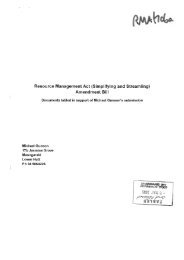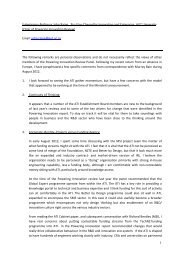Full paper text [PDF 3515k] - New Zealand Parliament
Full paper text [PDF 3515k] - New Zealand Parliament
Full paper text [PDF 3515k] - New Zealand Parliament
Create successful ePaper yourself
Turn your PDF publications into a flip-book with our unique Google optimized e-Paper software.
Nature of complaints<br />
The HDC received 1,564 new complaints<br />
during 2011/12 and resolved 1,380 1 . While<br />
there has been an increase in complaints<br />
received, it should not be concluded that the<br />
increase in complaints indicates a decrease<br />
in the standard of care being delivered<br />
to consumers in <strong>New</strong> <strong>Zealand</strong>. It is likely<br />
that the increase indicates a heightened<br />
awareness among consumers and providers<br />
of the Code and improved complaints<br />
processes. Every complaint represents an<br />
opportunity to learn. For the year ending<br />
2011, 679 (50.1%) of the complaints closed<br />
concerned Treatment as the primary issue,<br />
compared with 42.1% in the past year.<br />
As Figure 5 shows, many factors lead<br />
someone to complain to the HDC.<br />
For example, there has been<br />
700<br />
600<br />
500<br />
400<br />
300<br />
200<br />
100<br />
0<br />
664<br />
Treatment<br />
201<br />
Communication<br />
Medical Record/Reports<br />
an increase in the number of complaints<br />
about medical records and reports. The<br />
Commissioner does not have jurisdiction<br />
over issues of inaccuracies in medical records,<br />
so these issues are referred to the Privacy<br />
Commissioner. Communication remains<br />
a signifi cant issue, and featured as the<br />
primary concern in 201 complaints closed<br />
last year. Poor communication includes a<br />
rude or unhelpful manner as well as issues of<br />
inadequacy. Every consumer has the right to<br />
“be treated with respect” as well as the right<br />
to “effective communication.” Even where<br />
communication is not the primary issue<br />
complained of, ineffective communication<br />
is a common aspect of many complaints.<br />
Effective communication is at the heart<br />
of consumer-centred care.<br />
79 76 71 69 57 51 45 67<br />
Professional Conduct<br />
Consent/Information<br />
Access/Funding<br />
Disability/Other Issues<br />
Medication<br />
Management of Facilities<br />
Figure 5: Complaints closed – nature of complaints<br />
Providers complained about<br />
Of the 1,564 complaints received during 2011/12, 1,037 individual providers and 1,217 group<br />
providers were identifi ed.<br />
350<br />
300<br />
250<br />
200<br />
150<br />
100<br />
50<br />
0<br />
305<br />
117<br />
83<br />
57<br />
General<br />
Practitioner<br />
Physician<br />
Dentist<br />
Nurse 55<br />
Psychologist<br />
Figure 6: Complaints against individual providers<br />
53<br />
Midwife<br />
51<br />
General Surgeon<br />
51<br />
48<br />
190<br />
22<br />
Orthopaedic<br />
Surgeon<br />
Psychiatrist<br />
Obstetrician/<br />
Gynaecologist<br />
Other<br />
1 Both of these totals are second only to 2010, when numbers were infl ated by a large number of complaints<br />
arising from a change in the provision of Auckland laboratory tests.<br />
Other<br />
HDC ANNUAL REPORT 2012<br />
Note: The Physician category includes all specialities<br />
that are included in the Royal Australasian<br />
College of Physicians, such as dermatologists,<br />
haematologists, gastroenterologists.<br />
15


![Full paper text [PDF 3515k] - New Zealand Parliament](https://img.yumpu.com/11267192/17/500x640/full-paper-text-pdf-3515k-new-zealand-parliament.jpg)



![Full evidence text [PDF 8908k] - New Zealand Parliament](https://img.yumpu.com/14025494/1/184x260/full-evidence-text-pdf-8908k-new-zealand-parliament.jpg?quality=85)
![−3 JUN 2009 IRELEASED] - New Zealand Parliament](https://img.yumpu.com/12829724/1/185x260/3-jun-2009-ireleased-new-zealand-parliament.jpg?quality=85)


![Full evidence text [PDF 9k] - Parliament](https://img.yumpu.com/7938085/1/184x260/full-evidence-text-pdf-9k-parliament.jpg?quality=85)





